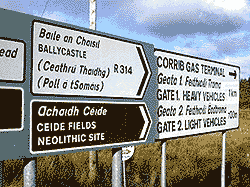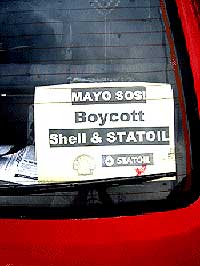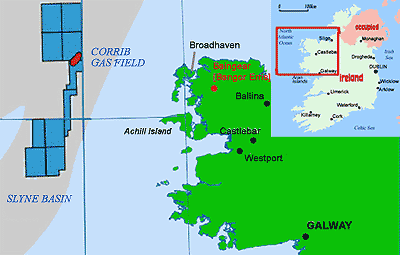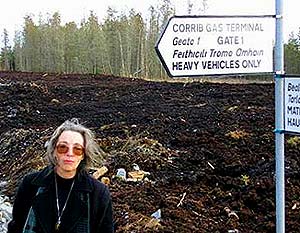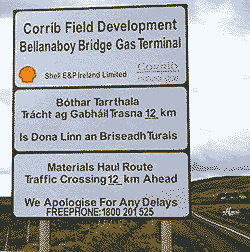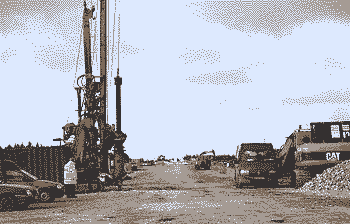|
from 07 august 2005
blue vol IV, #18 |
|
|
This time, five men - Philip McGrath, Willie Corduff, Vincent McGrath, James Brendan Philbin and Micheál Ó Seighin - are in gaol for opposing Shell. Their crime, refusal to allow Shell access to their land - a right that they hold under the Irish Constitution. Shell had come to a cosy arrangement with the Irish government. It allowed them to threaten with High Court action anyone who interfered with the construction of their high pressure gas pipeline and refinery on the Erris, Co Mayo coastline. The five men did just that - ignoring the compulsory purchase order legislation that said Shell could come onto their farm land - and found themselves in gaol up in Dublin. The state wasn't messing. According to Maura Harrington, who speaks for the local campaign, anyone "preventing or interfering with Shell carrying out works on the pipeline and the refinery, travelling to and from their construction sites, causing nuisance to the developers, 'trespassing' on a public right of way, attempting to damage the developer economically, intimidating or threatening them or conspiring to do any of the above, [does so] under pain of fine or imprisonment". Now, the solidarity camp that was set up in June in this remote corner of north-west Mayo overlooking the wide Atlantic aims to do just that. Following the gaoling of the five Erris men on 29th June, pickets at Ballinaboy (site of the refinery), Rossport (site of the construction compound) and Glengad (site of the landfall of the pipeline) have intensified. This, and public opinion, has led to the cessation of construction at the proposed refinery and at Glengad, but, since the men were sent to gaol, both the Irish state and Shell have tried to ignore the controversy while the liberal darlings of the Irish media has pretended it did not exist. On 2nd August Noel Dempsey, the minister responsible for the marine and for national resources, gave Shell permission to build the offshore section of the pipeline, sparking more protests. When Dempsey said, on 2nd August, that the Shell operation was "strategically important for Ireland in terms of enhancing security of gas supply" it was if he and none of his political cohorts had heard a single word spoken by people concerned about the Corrib gas field since it was discovered in 1996. The Corrib field would have been a huge asset to the people of Ireland, but Ray Burke, Minister for Energy in the 1980s and later sent to gaol for corruption, gave away the rights to gas and oil discoveries. This gave Shell, who bought those rights, the kind of concessions the Irish state has been doling out to corporations since the 1960s. Shell, in consortium with Statoil Exploration (Ireland) Limited and Marathon International Petroleum Hibernia Limited, now own the Corrib gas, every last cubic metre of it. They also own the land where they propose to build a large refinery. Shell bought this land from Coillte Teoranta, a semi-state body that "manages" Irish forestry, even though all the forestry under state control was given to the people of the Ireland in the early 1970s. In 2003, An Bord Pleanála (planning appeals board) inspector, Kevin Moore, was critical of the sale of the Coillte site and described it as a waste of a valuable state resource. The pipeline didn't become a concern until the people of Erris realised exactly how it would be operated, the damage it could do their environment and the threat it could pose to their safety. This was five years ago and according to Maura Harrington no one "had the faintest conception of what the pipeline entailed". Enterprise Oil, who were responsible for the gas at that time, announced that the Corrib gas would be pumped across Ireland and eventually into Scotland via a high pressure pipeline, coming ashore at Glengad in Erris. "I really did think that with the gas coming into Erris that there would be gas, piped along country roads into the houses, which I know now was a ludicrous notion. "But at the time a lot of so-called movers and shakers, and those who are considered influential bought into this, and they came out in favour of it, this included both Church and State, moulders of opinion, because they thought it would be a very good idea, and because they don't have what it takes to admit they were wrong they are still caught in that spin of the oil companies" .It didn't take long for the Erris people to lose their naiveté. "From an early stage in the campaign we met with [Sister] Majella McCarron, who had 30 years experience in Nigeria and who personally knew Ken Saro Wiwa, we made links with her in 2001. I attended the Shell AGM in London last year. I asked if the directors were aware of the health and safety implications of the proposed pipeline" In their usual fashion, Shell's main men dismissed the little woman from Mayo, but it wasn't long before Harrington realised the extent of Shell's power. "In July 2002 [we had] a small scale version of what Shell do globally, they had begun to do horrible damage at the beach in Glengad, they had broken through the sandy cliff base, and they had a digger. The digger was just kinda on the shore and Shell called the Garda (police), so the Garda came and were given a guarantee that the digger would be moved off the shore. I went into my school but before I left there to go home I drove back through Glengad and lo and behold the digger was further down the shore. So I went down on my own and it was a local person driving the digger, he is actually related to me, a Sweeny, and what I said to him, though I doubt he heard as he had the engine going at the time, I mentioned my grandfather, god rest him he is long dead, I told him Anthony Sweeny would come back and haunt him, whatever Anthony Sweeny's spirit did it was enough for yer man to switch off the machine leaving the bucket touching the ground and just instinctively I hopped up on it and sat on it, and I had my mobile phone so I just rang around and more people came to stay with me". This was a defining moment of resistance for the Erris people, who now want activists to join them, to maintain the pickets and continue giving Shell a hard time. The solidarity camp has attracted activists from other parts of Ireland, from Britain and from continental Europe. Their efforts will focus on picketing the Rossport compound daily from 7am to 7pm, as it is anticipated that efforts will be made by Shell's subcontractors to resume work sooner rather than later. Harrington gives her support to the solidarity activists and attends the protest regularly. For her these activists are "in it for the long haul". Shell, in their arrogance, never expected this. By not listening to the demands of the Erris people, who began their campaign with enquiries about health and safety, Shell have dug a hole for themselves and plunged Fianna Fail, the ruling government party, into it. Now, long after the issue was forgotten, the Irish government have to deal with the issue of the ownership of the gas. The gaoled men have said they will stay where they are until their demands are met:
Unlike the Glen of the Downs campaign in the mid-1990s, which never had local community support, or the flawed GMO campaigns around the same time, the Shell to Sea campaign had a local-global orientation from the beginning and not just because Harrington got in touch with Sister Majella McCarron for her Nigerian experience. The support from the Galway anarchists, from Grassroots Gathering activists and from campaigning groups and individuals around the country always meant that this campaign would have a harder edge. Sinn Fein's involvement, which has been constant since it was first announced that a refinery and pipeline would be built, has been crucial, and no less important has been the support given by The Socialist Party and The Green Party, though they did take their eye off the ball when it came to Shell's environmental impact statement, planning application, planning appeal and the legislation specifically dressed-up for corporates like Shell. But Fianna Fail gave the campaign a boost when it repeated the errors it once made over fishing licenses back in the 1980s - especially in County Mayo. These mistakes could be costly to Fianna Fail, who have seen their support in Mayo reduced by more than a half, according to an opinion poll carried out for the Mayo Echo. At the 2002 Irish general election Fianna Fail got 40% of the vote. According to the Echo poll it currently stands at 16.5%. Putting the Rossport 5 in gaol could be the downfall of the party in Mayo, and possibly in the country generally. A majority of those polled now support the processing of the gas at sea, a key demand of the gaoled Erris men and of their community. Ireland is not Nigeria, even if it does seem that way to some Irish people, and Sister McCarron has often wondered about her homeland since she returned ten years ago and found that it had been taken over by the corporates and was being governed by the rules of globalisaton. Shell has treated the people of Erris with contempt and it has underestimated the people of Ireland. This campaign is going to expose Shell once again, but this time they won't be able to crush the opposition as easily as they have done in the past. Sister McCarron sees huge similarities between Nigeria and Ireland. "Shell prepares the citizenry in both countries particularly in its proclaimed goodwill towards local concerns [with] sponsorships, scholarships and community development projects," she said as the Rossport 5 spent their fifth week in gaol. But if this is the benevolent aspect of their behaviour, there is a malevolent aspect. "For the Irish public the behaviour of the Irish government and Shell beggars all belief. At best it shows up a total lack of capacity to deal with big projects intellectually and at worst it is configuring a jigsaw of collusion, which is so obvious that it should make us scared about those in control of our national destiny".
At the beginning of August, after visiting the men in gaol, she said: "Because I lived through the awfulness of the Ogoni experience ten years ago and being back in Ireland I noted the first murmurings of a similar situation and spoke at a public meeting in Belmullet in 2000. I felt it was my responsibility to share that experience and to point out the Shell and state methodology which stared out at me in the Ogoni situation. "Yesterday (Friday 5th August) I was talking to Willie Corduff in prison and he says he thinks of my words every day since then and watches the same methodology unfolding in his struggle. The men hanged, and five men imprisoned because they dare to question. In their first week in prison I sent in personal copies of Ken Saro-Wiwa's last letter to me where he spelt out the storyline once again and called goodnight as he went off to sleep to prepare for the tedium of the next day's tribunal which was to sentence him to hang a month later. "His brother has been to Rossport and sat in on a day of the An Bord Pleanála Oral Hearings. Maura Harrington met his son and introduced the local Bogonis at the Galway Literary Festival. There is a strong vein of the personal in this local-global story. It is a story as much of the heart as the head. These stories must be told on paper too. "[Robert Allen's] Guests of the Nation was a godsend to me as I started the Irish campaign and began to engage Shell on the Ogoni issue. I found just one copy and it was like my mentor - it affirmed and filled out my experience of my lived model. Through it I was able to identify Irish communities struggling with this little known corporate experience. "Representatives of these communities in Ireland made up the panel of speakers at the first Annual Ken Saro-Wiwa Memorial Seminar. In 2001 and 2004 we held that seminar in Geesala and Ballina respectively and there the Bogonis found their first space. I remain committed to the issues of small communities and especially those dealing with the corporates - that way I share the Ogoni memory of my initial mentor Ken Saro-Wiwa". The Erris terror must end.
A Personal Experience
Shell prepares the citizenry in both countries, particularly in its proclaimed goodwill towards local concerns and so sponsorships, scholarships and community development projects [follow]. Why not do business in a visibly convincing good practice way and leave social concerns to the care of the state and the community. Stop using social involvement for PR purposes and as a path into the significant local people - who can bite the hand that feeds it? Many sponsorships are very hidden and not for advertisement purposes but for building a Shell crew on site. Nigeria is littered with such efforts, which, when investigated, are appalling. The Mayo people were both the target of the fawning concern and the nastiness when they did not play ball. They talk about this human discovery in a kind of awe. The Nigerian state is much more careful in [its] participation in its oil and gas industry. After independence it became joint partner in all oil and gas activity of all companies at a ratio of 60 to 40 in favour of Nigeria. Ireland is at a ratio of 0 to 100 in favour of Shell. Shell disobeys state rules on gas flaring and simply goes on paying the fines. There is evidence that the Nigerian state until recently gave carte blanche to the companies to do what they will - very minimal regulation and one can always pay a fine. The Irish state has not uttered one word of criticism about Shell - what the penalty is for breaching ministerial consents. Does Shell activity become a matter for Irish law and will it simply pay the fine and carry on [with the] damage? Will it be brought to book on anything? This is a visible form of collusion. In fact, Shell embarrasses the quality of the Irish state. It deserts the minister in hiding information on the safety audit company, it tricks the minister in getting the offshore consent and next day it declines to act on it, it deceives it by sending in minimal reports on the welding of the onshore pipeline. For the Irish public the behaviour of the Irish government and Shell beggars all belief. At best it shows up a total lack of capacity to deal with big projects intellectually and at worst it is configuring a jigsaw of collusion, which is so obvious that it should make us scared about those in control of our national destiny. I am highly disgraced as an Irish citizen by the behaviour of the last week [when Shell breached state conditions] - it borders on the moronic. We all are shocked by it. Could it be this bad? When the minister is able to list ten points in public about the behaviour of Shell and takes an action of correction ... in his line of experts has he consulted the people who live in the bog and why did he overrule the conclusions of his own [planning] inspector, why is he on the search for other experts? There are no experts on such a pipeline because its kind does not exist anywhere else. The Ogoni people who live in the Niger Delta are those who know their waters and their mangroves - they can show today leaking and ruptured ageing pipes and contaminated areas. Why does Shell and the minister sing off the same sheet and rely on the public for correction, then apologise and pay the fine and hope the public quickly forgets or has no further power. The storyline is the same re Erris and the Niger Delta. There is no effective environmental national lobby in Ireland. At parochial level there can be. Strangely it does not offer or build a collaborative support. Each issue takes energy and resources, although Shell To Sea depends on the utter goodwill of its activists. In a booming economy and earning between 7am to 7pm can keep one dulled to events around one. Those who are kept very busy have no time to observe, to analyse and to think. In the Niger Delta there is time but no power in times of dictatorship. Multinationals thrive when democracy is at its lowest ebb. Because I lived through the awfulness of the Ogoni experience ten years ago and being back in Ireland I noted the first murmurings of a similar situation and spoke at a public meeting in Belmullet in 2000. I felt it was my responsibility to share that experience and to point out the Shell and State methodology, which stared out at me in the Ogoni situation. Yeaterday [Friday, August 5] I was talking to Willie Corduff in prison and he says he thinks of my words every day since then and watches the same methodology unfolding in his struggle. The [Ogoni] men hanged, and five [Irish] men [are] imprisoned because they dare to question. In their first week in prison I sent in personal copies of Ken Saro-Wiwa's last letter to me where he spelt out the storyline once again and called goodnight as he went off to sleep to prepare for the tedium of the next day's tribunal, which was to sentence him to hang a month later. His brother has been to Rossport and sat in on a day of the An Bord Pleanála Oral Hearings. Maura Harrington met his son and introduced the local Bogonis at the Galway Literary Festival. There is a strong vein of the personal in this local-global story. It is a story as much of the heart as the head. These stories must be told on paper too. [Robert Allen's] Guests of the Nation was a godsend to me as I started the Irish campaign and began to engage Shell on the Ogoni issue. I found just one copy and it was like my mentor - it affirmed and filled out my experience of my lived model. Through it I was able to identify Irish communities struggling with this little known corporate experience. Representatives of these communities in Ireland made up the panel of speakers at the first Annual Ken Saro-Wiwa Memorial Seminar. In 2001 and 2004 we held that seminar in Geesala and Ballina respectively and there the Bogonis found their first space. I remain committed to the issues of small communities and especially those dealing with the corporates - that way I share the Ogoni memory of my initial mentor Ken Saro-Wiwa.
|
|||||||||||||||||||
| BLUE is looking for short fiction, extracts of novels, poetry, lyrics, polemics, opinions, eyewitness accounts, reportage, features, information and arts in any form relating to eco cultural- social- spiritual issues, events and activites (creative and political). Send to Newsdesk. |

